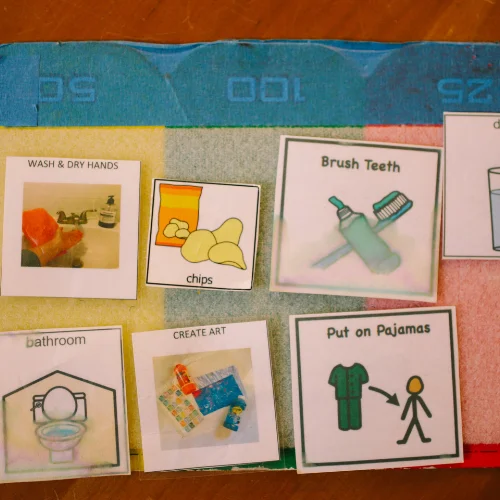Why Do Dementia Patients Talk Gibberish?
If you’ve ever interacted with someone living with dementia, you might have noticed them uttering words that don’t quite make sense or seem disconnected from reality. It can be confusing and even heartbreaking to witness, but there’s a lot more to this phenomenon than meets the eye. So, let’s roll up our sleeves and learn about the mystery of their gibberish talk!
Dementia Demystified

First things first, let’s get a grasp on what dementia is all about. Dementia is not a single disease but rather an umbrella term for a range of cognitive impairments that affect memory, thinking, and communication. Alzheimer’s disease is the most common form of dementia, accounting for about 60-80% of cases. Other types include vascular dementia, Lewy body dementia, and frontotemporal dementia, among others.
The Language and Communication Struggles

As dementia progresses, it takes a toll on the brain, affecting various regions responsible for language and communication. As a result, patients face challenges in expressing themselves clearly, finding the right words, and understanding what others are saying. Imagine trying to communicate with a tangled yarn ball, and you’ll get an idea of how they must feel. It’s like the words are there, but the threads connecting them have gone astray.
Word Salad: The Gibberish Talk
Here comes the peculiar part – the gibberish talk. In more advanced stages of dementia, you might encounter instances where patients seem to be spouting a mishmash of words that don’t form coherent sentences. This phenomenon is often referred to as “word salad.” It’s like someone tossed a bowl of words into the air, and they landed all scrambled up.
For instance, a dementia patient might say something like, “Purple sunshine piano jumping candy.” To us, this might sound like a random sequence of unrelated words, but for the individual with dementia, each word might hold some significance or be connected to a memory or emotion. It’s like trying to decipher a secret code without the decoder ring.
Lost in Time and Space

One possible reason behind the gibberish talk is the disorientation experienced by dementia patients. Their sense of time and space can get all mixed up, and they may live in moments from their distant past, believing it to be the present. This can lead to them using outdated language or talking about events that occurred long ago as if they just happened yesterday.
Imagine if you were suddenly transported back to your high school days and started using slang from that era. It would surely raise a few eyebrows, but for dementia patients, it’s their reality, and they can’t always distinguish between the past and the present.
Emotions Running Wild

Another piece of the puzzle lies in the emotional aspects of dementia. As cognitive abilities decline, emotions can become more prominent and powerful. Words often become a vehicle for expressing those emotions, even if they don’t come out as coherent sentences.
Consider a time when you were so overwhelmed with joy or sadness that you couldn’t find the right words to describe your feelings. In such situations, you might have resorted to gestures, exclamations, or even random sounds to express yourself. For dementia patients, gibberish talk can be their way of expressing intense emotions that they struggle to put into words.
Retrieving the Past

Memories are like hidden treasures in the vast sea of our minds. For dementia patients, retrieving memories becomes increasingly difficult as the disease progresses. Yet, some memories might linger in their consciousness, and the associated words could emerge in their conversations seemingly out of context.
Imagine trying to find a specific book in a massive library without any organizational system. You’d be scanning the shelves, pulling out books at random, hoping to stumble upon the one you seek. That’s how memories work for dementia patients, and sometimes, they manage to find a piece of the puzzle, leading to moments of gibberish talk.
The Brain’s Broken Telephone
Now, let’s talk a bit about how the brain functions. It’s like a massive telephone exchange, with different areas of the brain communicating with each other to process and interpret information. However, in dementia, this communication network gets disrupted, leading to misfires and crossed wires.
It’s like trying to have a phone conversation during a thunderstorm with crackling lines and incomplete sentences. In dementia patients, the brain’s broken telephone can result in gibberish talk, as the signals get jumbled, and the intended messages get lost in the static.
Patience and Understanding: The Key to Connection

While gibberish talk can be perplexing, it’s essential to remember that the person behind those words is still there, longing for connection and understanding. As friends, family, or caregivers, we can play a vital role in making them feel heard and valued.
Patience is key. Instead of correcting them or asking for clarity, try to focus on the emotions and intentions behind their words. Respond with empathy and affection, even if you don’t fully comprehend what they’re saying. Your presence and willingness to listen can be a lifeline amidst the swirling tides of dementia.
What does it mean when an elderly person starts talking gibberish?
When an elderly person starts talking gibberish, it could be indicative of various underlying factors. One common cause could be related to cognitive decline or dementia. As people age, their brain function may decline, leading to difficulties in finding the right words or organizing their thoughts.
For instance, they might mix up words or use nonsensical phrases. This might manifest in everyday conversations, making it challenging for them to express themselves clearly. For example, they may say something like, “I need to find my book on the refrigerator.”
Another reason for talking gibberish could be delirium, a sudden and severe confusion often triggered by illness, medications, or hospitalization. In this state, an elderly person might speak incoherently due to a temporary disturbance in their mental clarity.
For instance, they might string together unrelated words or be unable to focus on a particular topic. It’s crucial to identify and address the underlying cause promptly to support their recovery and prevent further complications.
Sometimes, talking gibberish might be a result of medication side effects. Certain drugs can affect an individual’s cognitive function, causing them to become confused or disoriented in their speech.
For example, if an elderly person is taking multiple medications, they might experience drug interactions that lead to cognitive impairment and difficulties in articulating their thoughts coherently.
Moreover, sensory impairments like hearing loss can also contribute to talking gibberish in elderly individuals. If they are unable to hear conversations clearly, they may respond with inappropriate or nonsensical answers. Similarly, vision problems might affect their ability to understand social cues, leading to confused conversation responses.
In conclusion, when an elderly person starts talking gibberish, it can signal various underlying issues, including cognitive decline, delirium, medication side effects, or sensory impairments. It’s essential to observe these changes and consult a healthcare professional for a thorough evaluation and appropriate management.
Is talking gibberish a sign of dementia?
Talking gibberish can be a sign of dementia, a condition that affects memory, cognitive abilities, and communication skills. When someone starts talking nonsensically or struggles to form coherent sentences, it might indicate an underlying issue with their brain function.
For instance, a person with dementia might have difficulty finding the right words to express themselves, leading to jumbled or unrelated phrases like, “The blue elephant flew to the moon on a purple tricycle.”
Although talking gibberish can be a sign of dementia, it’s essential not to jump to conclusions too quickly. Occasionally, people might speak incoherently due to fatigue, stress, or certain medications.
For example, someone who is sleep-deprived might say something like, “Spoon the bed under the dog,” instead of “Put the dog under the bed.” Similarly, some medications can cause temporary confusion, leading to nonsensical speech patterns.
However, if talking gibberish becomes a recurring and noticeable behavior, it’s crucial to consider the possibility of dementia or other cognitive impairments. Dementia is a progressive condition, and over time, the person’s ability to communicate effectively may deteriorate further. They might need help to recognize familiar people or remember the meaning of common words, making conversations increasingly challenging and perplexing.
Conclusion
In the whirlwind of dementia, gibberish talk emerges as a complex yet poignant aspect of communication. While it may be challenging to comprehend, it serves as a reminder of the profound impact this disease can have on a person’s mind and memories.
Understanding the reasons behind this gibberish talk can help us become more compassionate and supportive caregivers, family members, and friends.
So, let’s remember to be patient listeners, cherishing the moments of connection we can share with our loved ones living with dementia. Have you had any experiences with dementia patients talking gibberish? How did you handle those situations, and what did you learn from them? Share your thoughts and stories in the comments below. Let’s engage in a meaningful conversation!

